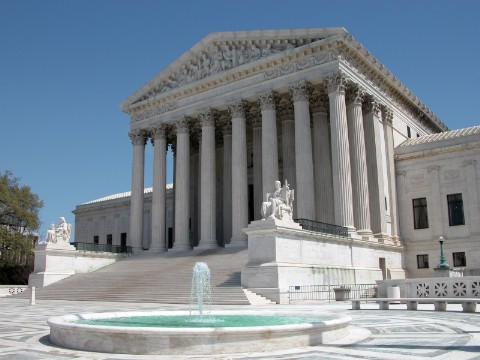
In a 5-4 decision, the Supreme Court held that the town of Greece did not violate the First Amendment by opening its meetings with a prayer.
While anyone could give a prayer at a town of Greece board meeting, from 1999 to 2007 all pray givers were Christian. Some referred to Jesus in their prayers. The town recruited “board chaplains” from a local directory and nearly all congregations were Christian. Clergy crafted their own messages without any input from the town.
Susan Galloway and Linda Stephens argued that legislative prayer cannot contain sectarian language or themes such as the “death, resurrection, and ascension of the Savior Jesus Christ.” They also argued that prayers before town board meetings “create social pressures that force nonadherents to remain in the room or even feign participation in order to avoid offending the representatives who sponsor the prayer and will vote on matters citizens bring before the board.” Justice Kennedy’s majority opinion rejected both arguments.
In Marsh v. Chambers, in 1983, the Court held the Nebraska Legislature didn’t violate the First Amendment by opening its sessions with a prayer delivered by a chaplain paid from state funds. The proposition that Marsh allows only nonsectarian prayer “is irreconcilable with the facts of Marsh and with its holding and reasoning.” Only allowing nonsectarian prayer would require state legislatures and local governments to “act as supervisors and censors of religious speech” and it isn’t clear when a prayer is sectarian. But, the Court warned, sectarian prayers can go too far “[i]f the course and practice over time shows that the invocations denigrate nonbelievers or religious minorities, threaten damnation, or preach conversion.”
Galloway and Stephens argued that in terms of coercion, prayer in the town board meeting context is fundamentally different than prayer in the state legislative context because citizens can only address state legislatures by invitation, but citizens often attend town board meetings because they have business before the board. But prayers in both contexts aren’t intended for the public but for the lawmakers “who may find that a moment of prayer or quiet reflection sets the mind to a higher purpose and thereby eases the task of governing.” Coercion could be possible though “if town board members directed the public to participate in the prayers, singled out dissidents for opprobrium, or indicated that their decisions might be influenced by a person’s acquiescence in the prayer opportunity.”
Justices Thomas and Scalia didn’t join the Court’s coercion analysis but joined the Court’s judgment. They opined that First Amendment coercion exists only “by force of law and threat of penalty.” The Court’s “liberal” justices dissented: Justice Kagan’s opinion was joined by Justices Ginsburg, Sotomayer, and Breyer, who also wrote separately.
The State and Local Legal Center, the International Municipal Lawyers Association, and the National Conference of State Legislators are holding a free webinar on May 28, 1-2 p.m. (EDT), to discuss this ruling, and those who want to attend can register here. Tom Hungar; Gibson Dunn, who argued this case before the Supreme Court; Douglas Haney, city attorney, Carmel, Indiana; and Lanny Proffer, former general counsel for the National Conference of States Legislatures, will participate in a discussion about how the Court's ruling affects both state and local government.
New, Reduced Membership Dues
A new, reduced dues rate is available for CAOs/ACAOs, along with additional discounts for those in smaller communities, has been implemented. Learn more and be sure to join or renew today!
